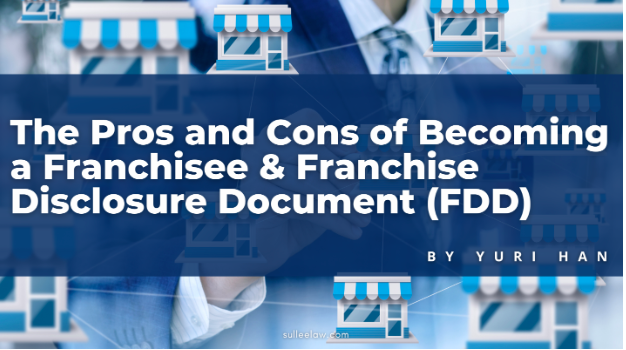When you see a franchisee store that is doing well, you may contemplate opening one yourself. Generally, becoming a franchisee is quite easy if you have startup capital. However, you need to consider the pros and cons of becoming a franchisee to determine if it is really for you.
Pros of Becoming a Franchisee
Due to the high level of consumer awareness of a franchisor’s products or services, it may be easier to obtain loans to become a franchisee, and the likelihood of success is greater than the risk of failure. In addition, good franchisors render ongoing support by providing systematic training to their franchisees.
Cons of Becoming a Franchisee
You may think you will be your own boss by becoming a franchisee. When you become a franchisee, you must comply with the rules your franchisor set up in the franchise agreement. This may mean your franchisor retaining the right to approve sites and not approving the site you have in mind for your store. As a franchisee, you would need to comply with store operation rules, store interior design, and purchase supplies only from specific suppliers set by your franchisor. Moreover, being a franchisee costs a lot of money. Specifically, your initial franchise fee will be considerable as you will have to rent, construct improvements, buy equipment, and pay for the “grand opening” fee. Some franchisors require payment of royalties based on a percentage of your gross sales. Some franchisors require their franchisees to renovate and pay for periodic design changes in franchisees’ space. Oftentimes, advertising fees and ongoing training and management guidance fees must be paid separately. These fees can add up and be very costly and burdensome for some franchisees.
FDD
The Franchise Disclosure Document (FDD) is a legal document that the Federal Trade Commission (FTC) requires franchisors to provide to prospective franchisees. Franchisors are required to give the FDD at least 14 days before franchisees are asked to sign any contract or pay any money. We advise you to request the most recent FDD from your potential franchisor as soon as possible and review it thoroughly to (1) understand your expected obligation as a franchisee and the obligations of a franchisor (be aware of language such as “may” which indicates a franchisor may provide ongoing training but is not obligated to provide one), (2) figure out how your prospective franchisor worked with its franchisees in the past, and (3) ask questions to clarify your understanding as needed.
Below are 23 items that need to be disclosed by a franchisor:
Item 1: The Franchisor, and any Parents, Predecessors, and Affiliates. This information background information may include the name and principal business address of the franchisor and its parent, predecessors, and affiliates, the franchisor’s other business activities, and the type of organization used by the franchisor, e.g., corporation, limited liability company, etc.1
Item 2: Business experience. The information on the name and position of the franchisor’s executive team, such as principal officers and directors who run the franchise and their employers and positions during the past five years, needs to be disclosed.2
Item 3: Litigation. A franchisor needs to disclose pending and prior actions. For pending actions, the status of the action needs to be disclosed. For prior actions, the date the judgment was entered, and any damages or settlement terms need to be disclosed.3
Item 4: Bankruptcy. A franchisor needs to disclose bankruptcies involving itself, its predecessors, and its affiliates within the past 10 years.4
Item 5: Initial Fees. A franchisor must disclose the initial fees and any conditions under which these fees are refundable. If the initial fees are not uniform, disclose the range or formula used to calculate the initial fees paid in the fiscal year before the issuance date and the factors that determined the amount.5
Item 6: Other Fees. A franchisor must disclose all other fees its franchisee would need to pay e.g., royalties, and fees for lease negotiations, construction, remodeling, additional training or assistance, advertising, advertising cooperatives, purchasing cooperatives, audits, accounting, inventory, transfers, and renewals.6
Item 7: Estimated Initial Investment. A franchisor must disclose the estimated initial investment cost e.g., the initial franchise fee, training expenses, real property- whether purchased or leased, equipment, fixtures, other fixed assets, construction, remodeling, leasehold improvements, and decorating costs- whether purchased or leased, inventory to begin operating, security deposits, utility deposits, business licenses, and other prepaid expenses.7
Item 8: Restrictions on Sources of Products and Services. A franchisor must disclose goods and services a franchisee must purchase from the franchisor, specific designee, or suppliers approved by the franchisor, or under the franchisor’s specifications. 8
Item 9: Franchisee’s Obligations. A franchisor must disclose principal obligations expected of its franchisee during the relationship.9
Item 10: Financing. A franchisor must disclose the terms of each financing arrangement, including leases and installment contracts, that the franchisor, its agent, or affiliates offer directly or indirectly to the franchisee. For each financing arrangement, a franchisor must state: (1) what the financing covers (for example, the initial franchise fee, site acquisition, construction or remodeling, initial or replacement equipment or fixtures, opening or ongoing inventory or supplies, or other continuing expenses); (2) the identity of each lender providing financing and their relationship to the franchisor (for example, affiliate); (3) the amount of financing offered or, if the amount depends on an actual cost that may vary, the percentage of the cost that will be financed; (4) the rate of interest, plus finance charges, expressed on an annual basis; (5) the number of payments or the period of repayment; (6) any security interest required by the lender; (7) whether a person other than the franchisee must personally guarantee the debt; and (8) whether the debt can be prepaid and prepayment penalty, if any.10
Item 11: Franchisor’s Assistance, Advertising, Computer Systems, and Training. A franchisor must disclose pre-opening and ongoing assistance that its franchisee can get from a franchisor.11
Item 12: Territory. A franchisor must disclose territorial information and restrictions, including, but not limited to, the expected territory size, whether the territory will be exclusive, and any conditions of relocation.12
Item 13: Trademarks. Discloses the trademarks registered to the franchise.13
Item 14: Patents, Copyrights, and Proprietary Information. A franchisor must disclose patents, copyrights, and other protected information not covered under Item 13. 14
Item 15: Obligation to Participate in the Actual Operation of the Franchise Business. A franchisor must disclose whether it expects its franchisee to directly participate and provide on-site supervision or if a franchisee may hire an on-premises supervisor and any limits on whom a franchisee may hire.15
Item 16: Restrictions on What the Franchisee May Sell. A franchisor must disclose whether a franchisee should sell only goods or services approved by the franchisor, sell all goods or services authorized by the franchisor, and whether the franchisor has the right to change the types of authorized goods or services.16
Item 17: Renewal, Termination, Transfer, and Dispute Resolution. A franchisor must disclose, in the tabular form that cross-references each enumerated franchise relationship item with the applicable provision in the franchise or related agreement: a. length of the franchise term, b. renewal or extension of the term, c. requirements for franchisee to renew or extend, d. termination by franchisee, e. termination by franchisor without cause, f. termination by franchisor with cause, g. “cause” defined-curable defaults, h. “cause” defined-non-curable defaults, i. franchisee’s obligations on termination on-renewal, j. assignment of contract by franchisor, k. “transfer” by franchisee-defined, l. franchisor approval of transfer by franchisee, m. conditions for franchisor approval of transfer, n. franchisor’s right of first refusal to acquire franchisee’s business, o. franchisor’s option to purchase franchisee’s business, p. death or disability of franchisee, q. non-competition covenants during the term of the franchise, r. non-competition covenants after the franchise is terminated or expires, s. modifications of the agreement, t. integration/merger clause, u. dispute resolution by arbitration or mediation, v. choice of forum, and w. choice of law.17
Item 18: Public Figures. A franchisor must disclose any compensation or other benefit given or promised to a public figure, the extent to which a public figure is involved in the management or control of a franchisor, and a public figure’s total investment in a franchisor.18
Item 19: Financial Performance Representations. For this item, a franchisor may provide information about the actual or potential financial performance of its franchised and/or franchisor-owned outlets, if there is a reasonable basis for the information. If a franchisor does not provide any financial performance representation in Item 19, it may state, “we do not make any representations about a franchisee’s future financial performance or the past financial performance of company-owned or franchised outlets.”19
Item 20: Outlets and Franchisee Information. A franchisor must state the number of company-owned outlets and franchised outlets in operation for the last three years.20
Item 21: Financial Statements. A franchisor must provide financial statements prepared by an independent certified public accountant, including balance sheets, statements of operations, owner’s equity, and cash flows of the previous two fiscal years. 21
Item 22: Contracts. A franchisor must attach a copy of all proposed agreements regarding the franchise offering, including the franchise agreement and any lease, options, and purchase agreements22
Item 23: Receipts. This item includes two copies of an acknowledgment of receipt of the FDD for a franchisee’s signature. A franchisor may include any specific instructions for returning the receipt. Remember that you want to choose a franchise that will bring you profits and success with reasonable franchise fees. You need to consider your loan payment amount, required franchisee fees, applicable taxes, and expenses, including but not limited to rent payment, insurance fees, wages to workers, and any other unanticipated expenses (e.g., attorneys’ fees for lawsuits that may be incurred down the road), and any competitor store that may affect your gross sales. As such, understanding the meaning of each disclosed item is important. Please review the FDD carefully and pay special attention to item 7 (Estimated Initial Investment), item 9 (Franchisee’s Obligations), item 11 (Franchisor’s Assistance, Advertising, Computer Systems, and Training), item 12 (Territory), and item 17 (Renewal, Termination, Transfer, and Dispute Resolution).23
- 16 C.F.R. § 436.5 (a)
↩︎ - 16 C.F.R. § 436.5 (b) ↩︎
- 16 C.F.R. § 436.5 (c) ↩︎
- 16 C.F.R. § 436.5 (d)
↩︎ - 16 C.F.R. § 436.5 (e)
↩︎ - 16 C.F.R. § 436.5 (f) ↩︎
- 16 C.F.R. § 436.5 (g)
↩︎ - 16 C.F.R. § 436.5 (h)
↩︎ - 16 C.F.R. § 436.5 (i)
↩︎ - 16 C.F.R. § 436.5 (j)
↩︎ - 16 C.F.R. § 436.5 (k)
↩︎ - 16 C.F.R. § 436.5 (l)
↩︎ - 16 C.F.R. § 436.5 (m)
↩︎ - 16 C.F.R. § 436.5 (n)
↩︎ - 16 C.F.R. § 436.5 (o)
↩︎ - 16 C.F.R. § 436.5 (p)
↩︎ - 16 C.F.R. § 436.5 (q)
↩︎ - 16 C.F.R. § 436.5 (r)
↩︎ - 16 C.F.R. § 436.5 (s)
↩︎ - 16 C.F.R. § 436.5 (t)
↩︎ - 16 C.F.R. § 436.5 (u)
↩︎ - 16 C.F.R. § 436.5 (v)
↩︎ - 16 C.F.R. § 436.5 (w)
↩︎

